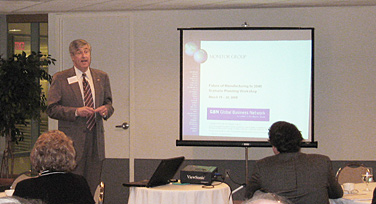|
|
|
||||||||
|
Short Takes: News from the International Trade Administration Web Site Offers Information on Sustainable Manufacturing Initiative U.S. companies looking to identify government programs and resources that can assist them in their sustainable manufacturing efforts can now use the recently updated Web site for the Department of Commerce’s Sustainable Manufacturing Initiative. The site was put together by the International Trade Administration’s Manufacturing and Services unit. The Sustainable Manufacturing Initiative is a dialogue between the public and private sectors that addresses the need for U.S. manufacturers to increase their global competitive advantage by developing and using cleaner, more energy-efficient technologies and by implementing manufacturing practices that are cost-effective and environmentally sound. The Web site is an outcome of the Sustainable Manufacturing Initiative’s inaugural meeting, which was held at the Department of Commerce in Washington, D.C., on September 27, 2007. The meeting, with its theme of “Enhancing U.S. Competitiveness through Sustainable Manufacturing: A Public–Private Dialogue,” attracted more than 70 participants from the public and private sectors. The site includes a full readout of the September 2007 meeting, a description of the next steps for the initiative, and a preliminary clearinghouse of U.S. government programs and resources that support sustainable business practices. Users can sign up to receive news and other updates on the Sustainable Manufacturing Initiative by e-mail. The Manufacturing and Services unit will chair a newly instituted sustainable manufacturing subcommittee of the Interagency Working Group on Manufacturing Competitiveness. This subcommittee will assemble interested federal agencies to implement the initiative and to better respond and collaborate with the private sector as it continues to embrace sustainable manufacturing practices and techniques.
Manufacturing Workshop Looks to Industry Needs of 2040 Technological advancements, alternative energy resources and renewable energy, and improvements to infrastructure are key elements in supporting the U.S. manufacturing sector, according to participants in a workshop, “Manufacturing 2040,” that was held at the Department of Commerce in Washington, D.C., on March 19–20, 2008.
Human capital was a particular area of concern. As one participant noted, “Most of our organizational models in the 20th century were used to maximize the output of labor. Successful new organizations understand that this model does not hold in the current context. Future organizations will have to both harness and liberate labor.” Participants in this two-day workshop also highlighted the importance of science and math education as a critical building block in developing a strong manufacturing workforce and in maintaining U.S. competitiveness in the global marketplace. The workshop brought together more than 20 senior-level participants from the manufacturing community, academia, and government. They participated in a series of small discussion groups that focused on the future of manufacturing. The event was conceived by the International Trade Administration’s Manufacturing and Services unit and was facilitated by Global Business Networks. For more information on the workshop, visit Manufacturing and Services.
Foreign Delegations Visit Consumer Electronics Show U.S. companies exhibiting at the recent Consumer Electronics Show (CES) in Las Vegas, Nevada, were the beneficiaries of several Commerce Department programs at the three-day event. CES is the world’s largest consumer electronics trade show and has been the showcase of cutting-edge technology for 41 years. CES participated in the International Buyers Program of the U.S. and Foreign Commercial Service (USFCS). Twelve foreign buying delegations from around the world attended the event after being recruited by USFCS staff members working out of U.S. embassies and consulates. The delegations were escorted to the show by Commerce Department trade specialists. USFCS also ran the show’s International Visitors Center, where U.S. companies could meet with foreign buyers. Officials from the International Trade Administration participated in a “Leaders in Technology” program at CES. The program featured panels of experts who discussed key industry issues facing the consumer electronics sector, including broadband, digital television, international trade, energy efficiency, electronics recycling, and eco-friendly product design. Areas of particular concern for electronics manufacturers are product convergence and environmental regulation. Product convergence is a phenomenon endemic to the consumer electronics industry, where the lines between technologies can dissolve, causing new categories of products to emerge. For example, what was once a computer monitor is now a multifunctional display that serves as both a television and a computer monitor. The challenge will be to enact internationally harmonized policies that efficiently facilitate trade in those products. Environmental regulation has been a stimulus for technological innovation, but the growing patchwork of domestic and international regulations increases costs for many consumer electronics companies. Uncertainty surrounding current and future environmental regulations causes inefficiencies and rising external costs for business. The Commerce Department’s Manufacturing and Services unit has spearheaded efforts to counter this trend with its Sustainable Manufacturing Initiative, which aims to identify key sustainable manufacturing challenges and to coordinate public–private projects that help businesses in their efforts to be more sustainable. For more information about CES, visit www.cesweb.org. For more information on the Sustainable Manufacturing Initiative, visit the Web site. Indrek Grabbi, Matthew Howard, and Carla Langjahr of the International Trade Administration’s Manufacturing and Services unit contributed to this section.
|
|
